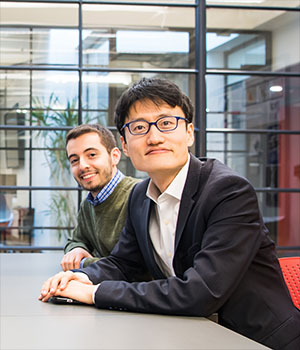
Jinhua Zhao
(he/him)
Urban Studies and Planning
Empowering and motivating
Despite innumerable responsibilities, Professor Jinhua Zhao shows up for his students with “unbounded energy.” That, according to student nominators, is what enables him to advise “each of his students in a personally meaningful way.”
As the Edward and Joyce Linde Associate Professor of City and Transportation Planning at MIT, Professor Zhao founded and directs the JTL Urban Mobility Lab. He brings behavioral science and transportation technology together to shape travel behavior, design mobility systems, and reform urban policies. Zhao develops methods to sense, predict, nudge, and regulate travel behavior; designs multimodal systems that integrate autonomous and shared vehicles with public transportation; and reforms urban policies to govern new technologies and business models. In particular, Zhao sees transportation as a language to describe a person, characterize a city, and understand an institution. Zhao leads long-term research collaborations with major transportation authorities and operators worldwide, including in London, Chicago, Hong Kong, and Singapore.
The Joy of Teaching
Formal teaching is a critical piece of Zhao’s mentorship style and a way his caring extends beyond his direct advisees. Zhao is continually thinking about how to refine his classes. As he writes, he “experiment[s] to motivate students,” and this shows. Students frequently “exert themselves far beyond the class requirement[s],” going on to present their work at conferences, participate in local transportation conversations, or develop their class projects into academic papers and theses.
Students emphasize that Zhao’s teaching makes them feel prioritized and capable. Zhao’s focus on teaching—and his students’ gratefulness for this focus—demonstrate how densely intertwined teaching and mentorship are.
In one thoughtful class model, Zhao and his students thoroughly dissect eight research projects. They consider how ideas develop and are executed, often inspiring students to see how they can work on building their own ideas. This attention to the process of idea formation, and not just the end product, is tremendously useful for students as they are working to become scholars.
Attending MIT can be an intimidating and humbling experience. In his quantitative reasoning class, Zhao “emphathize[s] deeply with students who find statistics difficult.” His lecture and discussion styles are well-received. One student writes that Zhao is “animated and engaged,” building an atmosphere that “encourages students to participate in class discussions, challenge assumptions, and think and collaborate in a multi-disciplinary way.”
Building Lab Culture
Multi-disciplinarity and inclusive diversity are attributes Zhao works hard to develop in the Urban Mobility Lab. In under seven years at MIT, Zhao has advised nine Ph.D. students and 37 Master’s students from three programs: Urban Studies and Planning; the Institute for Data, Systems, and Society; and Civil and Environmental Engineering. Additionally, he has supervised nine post docs, four of whom have gone on to become assistant professors.
Per a student nominator, Zhao “openly values his time with his family and encourages his students to invest in both their studies and their personal wellbeing.” Zhao checks in with his students at every meeting. In another nomination letter, a student comments that Zhao’s “attention to his students as human beings, and not just worker bees… struck me as truly exemplary.” Regular check-ins and support for work-life balance are Mentoring Guideposts identified by the C2C program.
Empowering the students in his lab is critical to Zhao’s approach. He describes the lab as an effective and communal workspace “where students feel at home, learn from each other, and increasingly self-govern.” Zhao is very present in the lab with “enthusiasm and positive energy” as well as “insightful and concise feedback,” according to students.
Lack of diversity in the field is an issue of which Zhao is keenly aware and strives to remedy. In particular, gender representation is far from balanced in the field. One student nominator remarks on how Zhao turns to his students for insight on building greater diversity and inclusion in the field: “A professor who asks his students for help is one who demonstrates humility, one of the most important traits a caring person can have.”
Students attest that Zhao’s receipt of the Committed to Caring honor is well-deserved. “Jinhua is inquisitive, open-minded, brilliantly critical, and yet kind.”
